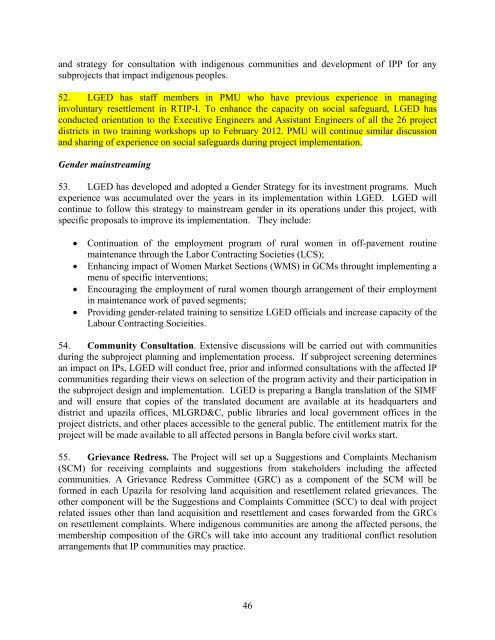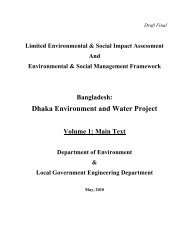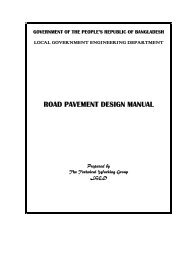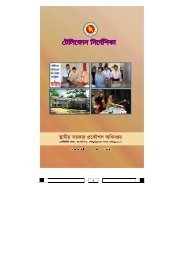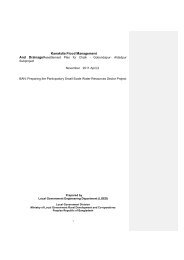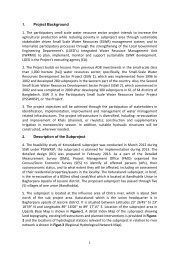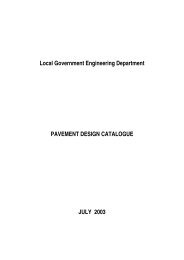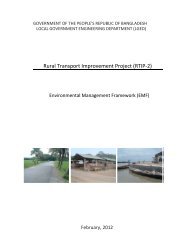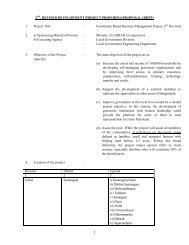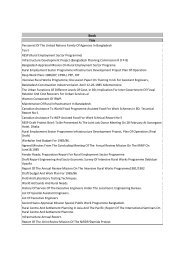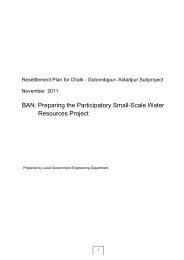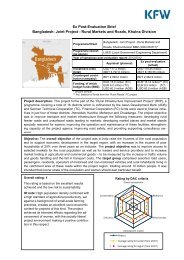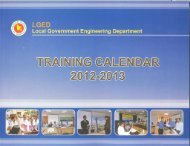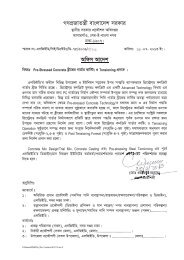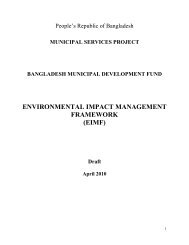PAD - LGED
PAD - LGED
PAD - LGED
You also want an ePaper? Increase the reach of your titles
YUMPU automatically turns print PDFs into web optimized ePapers that Google loves.
and strategy for consultation with indigenous communities and development of IPP for any<br />
subprojects that impact indigenous peoples.<br />
52. <strong>LGED</strong> has staff members in PMU who have previous experience in managing<br />
involuntary resettlement in RTIP-I. To enhance the capacity on social safeguard, <strong>LGED</strong> has<br />
conducted orientation to the Executive Engineers and Assistant Engineers of all the 26 project<br />
districts in two training workshops up to February 2012. PMU will continue similar discussion<br />
and sharing of experience on social safeguards during project implementation.<br />
Gender mainstreaming<br />
53. <strong>LGED</strong> has developed and adopted a Gender Strategy for its investment programs. Much<br />
experience was accumulated over the years in its implementation within <strong>LGED</strong>. <strong>LGED</strong> will<br />
continue to follow this strategy to mainstream gender in its operations under this project, with<br />
specific proposals to improve its implementation. They include:<br />
• Continuation of the employment program of rural women in off-pavement routine<br />
maintenance through the Labor Contracting Societies (LCS);<br />
• Enhancing impact of Women Market Sections (WMS) in GCMs throught implementing a<br />
menu of specific interventions;<br />
• Encouraging the employment of rural women thourgh arrangement of their employment<br />
in maintenance work of paved segments;<br />
• Providing gender-related training to sensitize <strong>LGED</strong> officials and increase capacity of the<br />
Labour Contracting Socieities.<br />
54. Community Consultation. Extensive discussions will be carried out with communities<br />
during the subproject planning and implementation process. If subproject screening determines<br />
an impact on IPs, <strong>LGED</strong> will conduct free, prior and informed consultations with the affected IP<br />
communities regarding their views on selection of the program activity and their participation in<br />
the subproject design and implementation. <strong>LGED</strong> is preparing a Bangla translation of the SIMF<br />
and will ensure that copies of the translated document are available at its headquarters and<br />
district and upazila offices, MLGRD&C, public libraries and local government offices in the<br />
project districts, and other places accessible to the general public. The entitlement matrix for the<br />
project will be made available to all affected persons in Bangla before civil works start.<br />
55. Grievance Redress. The Project will set up a Suggestions and Complaints Mechanism<br />
(SCM) for receiving complaints and suggestions from stakeholders including the affected<br />
communities. A Grievance Redress Committee (GRC) as a component of the SCM will be<br />
formed in each Upazila for resolving land acquisition and resettlement related grievances. The<br />
other component will be the Suggestions and Complaints Committee (SCC) to deal with project<br />
related issues other than land acquisition and resettlement and cases forwarded from the GRCs<br />
on resettlement complaints. Where indigenous communities are among the affected persons, the<br />
membership composition of the GRCs will take into account any traditional conflict resolution<br />
arrangements that IP communities may practice.<br />
46


